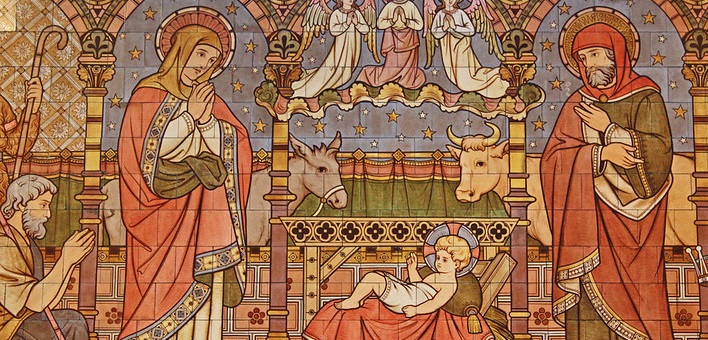Commentary on Luke 2:1-14 [15-20]
Christmas Eve. The preacher brings Luke’s story into the excitement of a family service and later into the reverence of candlelit worship full of people distracted by kids, plans, phones, hopes and griefs. Granted, audiences are always mixed, emotions often high. Yet Christmas Eve heightens the intensity, energy, and disparities gathered in congregations on this night, underlined by every commercial and artistic institution in our culture.
Luke’s story of Jesus’ birth is a story told quietly on earth, even as the energy and joy come from the heavens. The story is told in two distinct sections: 2:1-7 and 2:8-14 with a kind of coda of responses in 15-20. All these parts are important for the Christmas story. Let’s unwrap them.
The first section plunges us into the political realities of the world into which Jesus was born. Four times in the first five verses we hear the word “register” (apographein). “All the world must be registered” (verse 1) according to Caesar Augustus. Whether or not this is historically accurate as to date and breadth is less important than that it is the first line in the story of Jesus’ birth as Luke tells it. Joseph, Mary and Jesus are subject to Caesar Augustus. At great inconvenience they “go up” to Bethlehem (there is no mention of a donkey for the very pregnant Mary) because they must.
Because Luke reminds us that Bethlehem is a city of David and Joseph of the house of David, we look for a second story, God’s story, interwoven with Caesar’s power right from the start (see 1:32, 68-69). Even the little detail that Jesus is wrapped in swaddling cloths suggests that simple beginnings cannot separate a king from a peasant baby. See Wisdom 7:4-6. From the might of Caesar to command the whole world, to the swaddling of a newborn in a room shared with the household’s animals, Luke leads us into a world, our world, where we discern God’s power at work to keep all the promises cherished by Mary (Luke 1:46-55) and Zechariah (Luke 1:67-79).
In part two, the scene shifts to outlying fields where shepherds are watching their flocks during the night. Here, apart from kings and governors, apart even from the devout Mary who had received the promise of a child to sit on David’s throne, came brilliant, enveloping light. One angel with a clear message followed by a chorus of these messengers from God, just blows the shepherds right out of the fields. There is light to lighten their darkness (see also 1:79; 2:32) indeed.1
Let me offer a quick word about both shepherds and about verse 14b. Shepherds were not as scorned or feared as many have thought.2 They were indeed among the “lowly” (1:52), but in their diligent work modeled the way of God (and other Greco-Roman gods) with God’s people. On an ordinary night in a darkness that we electrified people can scarcely imagine, they were brought from enormous fear to the joy promised by angels. This is a significant dynamic in Luke’s story thus far: see 1;14, 28, 47, 58, and 24:36 and 53. Could this move be fruitfully explored in a year that includes everything from wildfires to all the losses and repercussions of Covid-19 to the frantic fear during the Afghanistan pullout?
Let it be said clearly this night. Heaven and earth meet in obscure places, not in the halls of power. Shepherds and angels. A birth in the city of King David, but far from a royal residence. And that birth, that joy is for all people, just as the census was said to have been. In verse 14a, “peace (good will) among those with whom God favors” is not a phrase designed to limit God’s favor and peace to a few. We human creatures, along with God’s other creatures, have been favored. The light came in those dark fields and that dim room in Bethlehem because God longs, has always longed, for us to know and love God.
The responses of both the shepherds and Mary to that good news, however imperfectly they may have perceived it, are worth noting, not least because they end the text. They will be the last words your congregation hears (if you read verses 15-20). Mary “pondered.” She had received a direct call from Gabriel, affirmed by the Holy Spirit through Elizabeth, her cousin. She has the promised child in her arms and hears again from shepherds that he is the Messiah and Lord (rather than Augustus Caesar whose claim to be Lord and Savior is well documented in the ancient world3). She held/treasured all this in her heart and pondered, wondering what it would all mean. She will wonder again after finding her son in the Temple as he amazed the teachers gathered around. Mary is there as Jesus’ life unfolds and she continues to try to fathom the connections of her boy with the promises of God. Some of us do the same. It is one of the roles of our gathered congregations as well.
The shepherds put things together well enough to become jubilant. They’re promised a baby, they see a baby, and they recognize that the rest of what they have been told is true. Here he is, the One whom God has sent to show God’s favor. Some of us do the same. It is another role of our gathered congregations. There’s a new world coming! And that’s good news for the people in our story. Maybe the Caesars of the world won’t understand how it is good news for them. Maybe it requires remembering and pondering or a sudden experience of brilliant light and angels to know good news. Perhaps one must first recognize the limits of human power over “all people.”
Here Luke shows us the first steps in a long journey of trusting that God’s favor is for all people and that there are signs, even in our own darkness.
Notes
- A wonderful painting by Henry Ossawa Tanner might inspire you: Henry Ossawa Tanner, Angels Appearing Before the Shepherds, 1910
- Joel B. Green, The Gospel of Luke. The New International Commentary on the New Testament. Grand Rapids, MI: William B. Eerdmans Publishing Company (1997), 130-131.
- Green, The Gospel of Luke, 133-135.


December 24, 2021